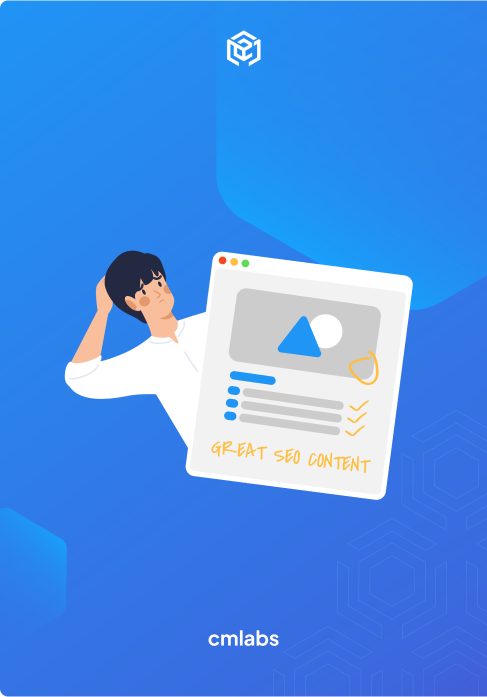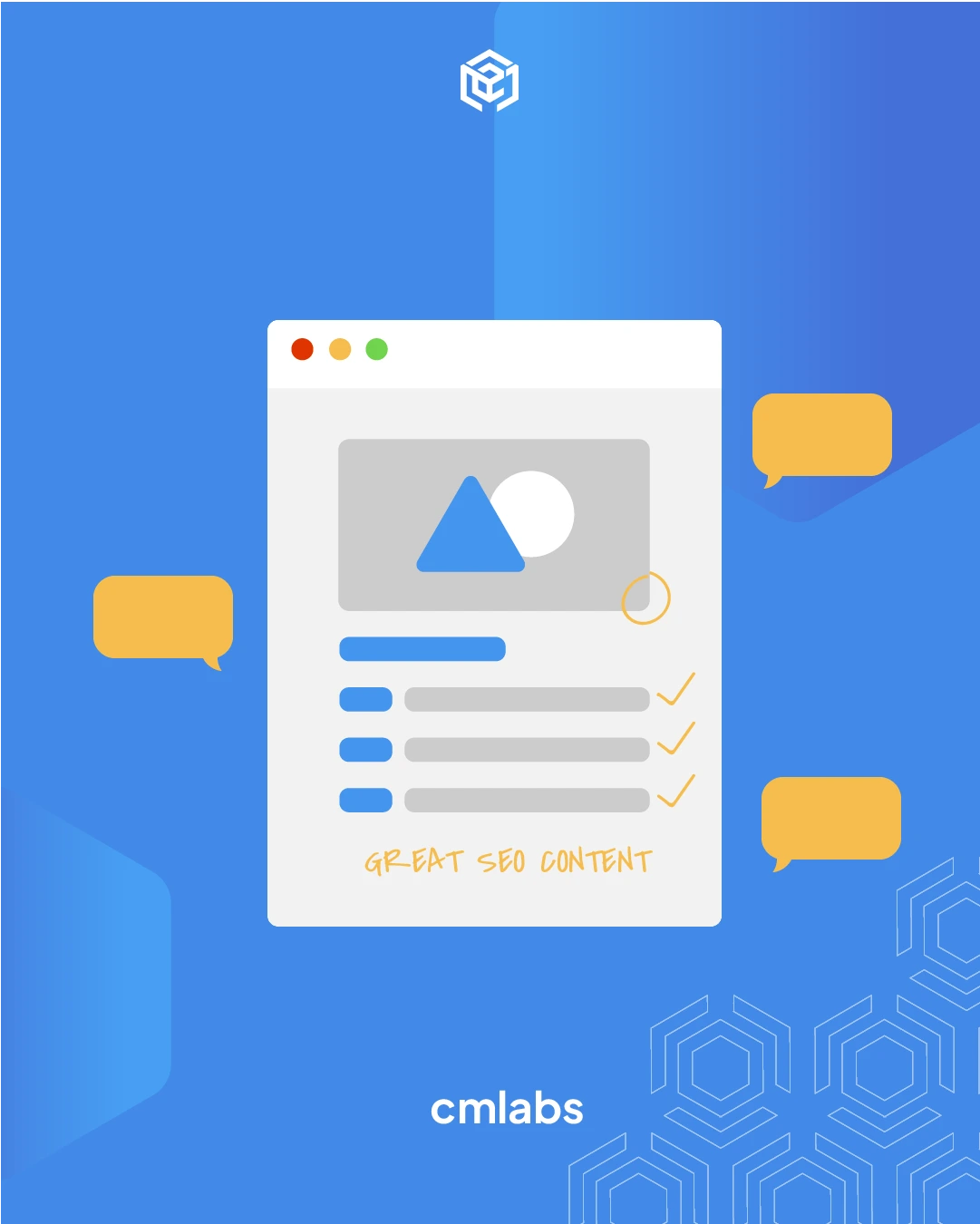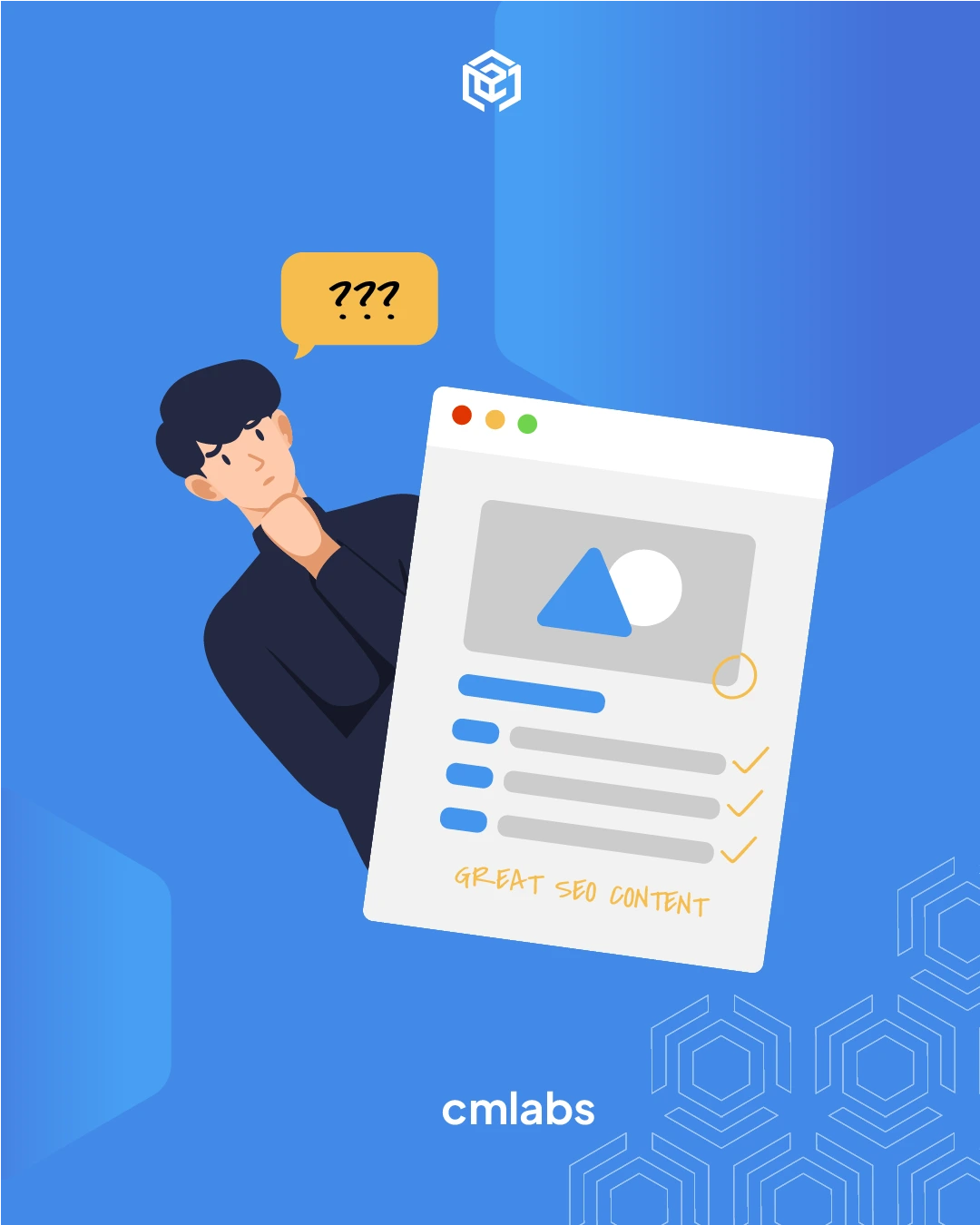We use cookies
This site uses cookies from cmlabs to deliver and enhance the quality of its services and to analyze traffic..
SEO SERVICES
Conduct in-depth technical website audits, strategically develop website projections, and increase your website authority.
ASO SERVICES
Elevate Your App’s Presence with Our Expert ASO Services – Boost Visibility and Drive Downloads!
WRITING SERVICES
We offer a variety of writing services to suit different business necessities. Reach broader audiences or lead specific industries? We've got you covered!
Get relevantly positive media exposure from bloggers and online publishers to increase your brand mentions on search engine results pages.
SEOlutions
A unified source of truth!
SEO & Digital Maternity Solution
SEO & Digital Maternity Solution: Leverage Cross-Platform Insights to Elevate Your Strategy with Expert Consultation
SEO & Digital Maternity Solution
Data Solution options:
Starting from Rp200 mio
Reinventing how a company get creative treatments
A new way to get your creative needs done. Agile team, efficient cost, and expedient way in a flexible yet scalable subscription plan!
Creative-as-a-Services
CaaS package options:
Based on Subscription
Pioneer in digital marketing software powerhouse
We’re excited to unveil our new range of Tech Solutions designed to drive your digital success. Whether you’re looking to enhance your website’s performance, streamline your tech stack, or unlock deeper insights from your data, we’ve got you covered.
Starting from Rp250 mio
Our Clients
Research and innovation center for digital transformation
Digital marketing combines technical skills and business knowledge at every stage. For marketing teams, improving budget management efficiency is crucial, as time is an invaluable resource that should be used wisely. At Sequence, we are dedicated to empowering you to optimize efficiency and strategic planning, ultimately enhancing the impact of your digital marketing efforts.
Subscription-based (IDR1,800/keyword)
Our Clients
BeyondSEO
References
SEO Tools for Webmasters
SEO Tools for Writers
SEO Tools
FIND THE SUITABLE PARTNERSHIP FOR YOUR COMPANY
Check out which cmlabs partnership program suits your company
WHITE LABEL SEO
for CorporateYour company is granted exclusive partnership rights to provide SEO services to our important clients, and we will provide a dedicated backend team to support your efforts.
AFFILIATE PROGRAM
for BizdevA new affiliate program is being introduced for skilled marketers and individuals with strong networks, offering commissions of up to 7% for generating profits independently.
DIGITAL AGENCY
for Marketing Partnerscmlabs is an essential partner for digital agencies, providing a unique selling proposition in Search Engine Optimization (SEO).
BACKLINK PARTNERSHIP
for Media / BloggerWe have a vast database of bloggers and media outlets across Indonesia, categorized by region and media type, giving our clients an edge in managing their media and SEO activities.
OFFICIAL TRAINING
We provide ongoing professional development and support to SEO professionals to ensure they are equipped to meet market demands.
JOIN AS CONTRIBUTOR
for Content WriterGreat opportunity for SEO Writers around the world. T&C applied!
ACADEMIC PARTNERSHIP
Through partnerships with universities in Indonesia, cmlabs has helped align academic curricula with industry demands.
Partnership
Sector & Industries
Tell us your SEO needs, our marketing team will help you find the best solution
As an alternative, you can schedule a conference call with our team
Schedule a Meeting?Contact
Survey
We use cookies
This site uses cookies from cmlabs to deliver and enhance the quality of its services and to analyze traffic..
Last updated: Sep 03, 2024
Minification is a technique used to decrease the size of JavaScript, HTML, and CSS files, helping to speed up a website's loading time. By minimizing these files, visitors can access your site more quickly, leading to an improved user experience.
The minification process involves removing unnecessary elements from the code, such as white spaces, comments, and line breaks. Essentially, it's about cleaning up the code after development by stripping out anything that's not essential.
Even though the formatting may look a bit off after minification, it won't impact the website's functionality. The server will actually have an easier time loading the website.
The technique works by eliminating unnecessary code that no longer serves a purpose on the website. Think of it like clearing out clutter—when you remove these extraneous elements, you free up space, allowing the server to perform better and load the website more quickly.
This optimization leads to enhanced website performance and a superior user experience. As a result, search engines are more likely to recommend your site in search results, and search engine bots will find it easier to index your pages.
A fast-loading website also attracts more visitors, and if your content is high-quality and credible, it also helps you build trust. In addition, increased site visitors can lead to a significant boost in traffic.
After you know what is minification, there are a few easy steps to minify your website. Here are the steps:
You can start by evaluating your site's performance using testing tools to identify areas that need optimization.
Many free tools are available online, but they often require more manual effort. Remember to back up your website files before testing, so you have a record of the scripts in case you need to make changes later.
The method for minifying depends on the file type you're working with—HTML, CSS, or JavaScript. Here's how you can do it:
How to Minify HTML
To minify HTML, you can use online tools or plugins in Content Management Systems (CMS) like WordPress to minify.
If you're using a WordPress plugin, you can go to your dashboard and select the Plugins menu. Then, click Add New.
Then, type LiteSpeed Cache in the search bar. When it appears, click Install Now and then Activate.
When the installation process is successful, you can select LiteSpeed Cache and then click Page Optimization. Then, click ON on HTML Setting.
Alternatively, you can do it manually by removing white space or unnecessary code manually. However, before performing HTML minification, you should back up the file or make a copy of it for documentation.
How to Minify JavaScript
To minify JavaScript, you can utilize tools on the internet as well as task runners and bundlers to make the modification process easier.
You can also utilize WordPress plugins such as the HTML modification process. The difference is that you need to enable JavaScript Settings first.
How to Minify CSS
To minify CSS, you can use several online tools that can modify CSS files. Furthermore, use a task runner or bundler to modify the CSS file automatically during the build process.
Just like JavaScript and HTML, you can conduct CSS minify using a WordPress plugin. You can follow the flow as described above, then click the ON button in CSS Settings.
How to Minify Images
In addition to the codes, you can also reduce the size of images to speed up loading times. Free tools and software are available online to compress images without sacrificing quality.
You can also minify your files using Cloudflare, a content delivery network (CDN) provider. Cloudflare’s Auto Minify feature can automatically reduce the size of HTML, CSS, and JavaScript files.
Just log in to the Cloudflare dashboard, select Speed, then Optimization, and enable Auto Minify on the Speed Optimization page for the files you want to reduce.
Once you've completed the minification process, it's important to re-analyze your site to ensure the changes were successful. You can use various free tools available online to do this.
Minifying your website can greatly reduce load times, resulting in a faster site. Just make sure to back up your files beforehand, especially if you're using an online tool for manual minification, so you can restore your scripts if something goes wrong during optimization.
WDYT, you like my article?
Couldn't find result for "Mulki" try to search with different keyword
Suggestion:
Tell us your SEO needs, our marketing team will help you find the best solution
As an alternative, you can schedule a conference call with our team
Schedule a Meeting?



cmlabs Jakarta Jl. Pluit Kencana Raya No.63, Pluit, Penjaringan, Jakarta Utara, DKI Jakarta, 14450, Indonesia
(+62) 21-666-04470These strategic alliances allow us to offer our clients a wider range of SEO innovative solutions and exceptional service.

Psst! Hey there, SEO Stats and Tools SEO company! If you've ever planned of conquering the Indonesia market, you've come to the right place!